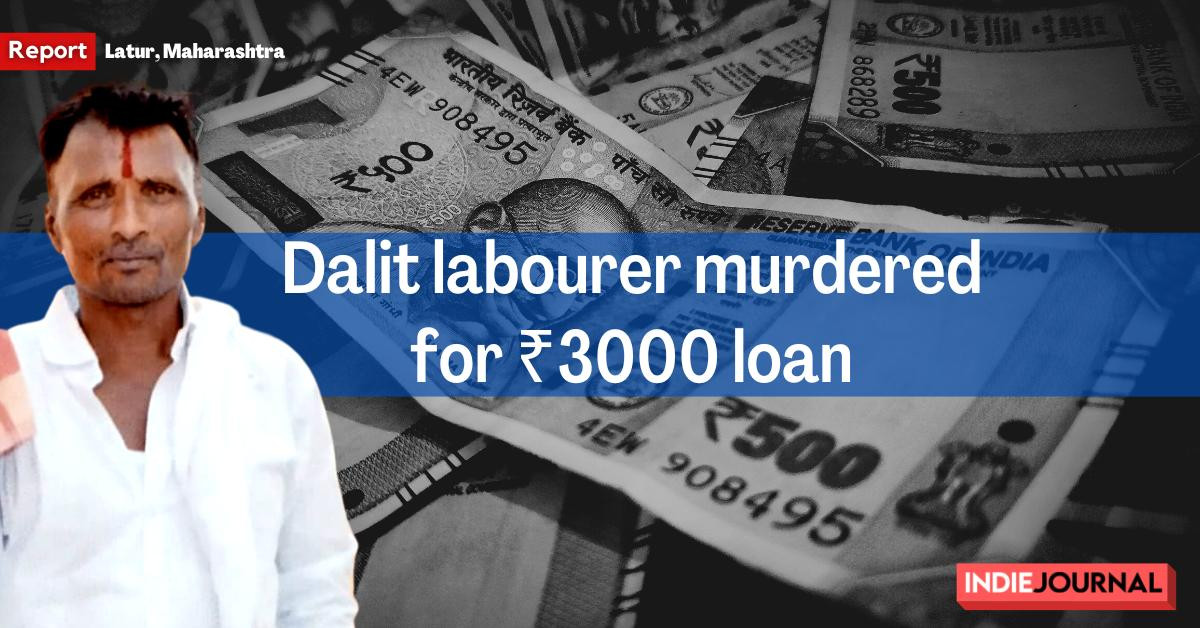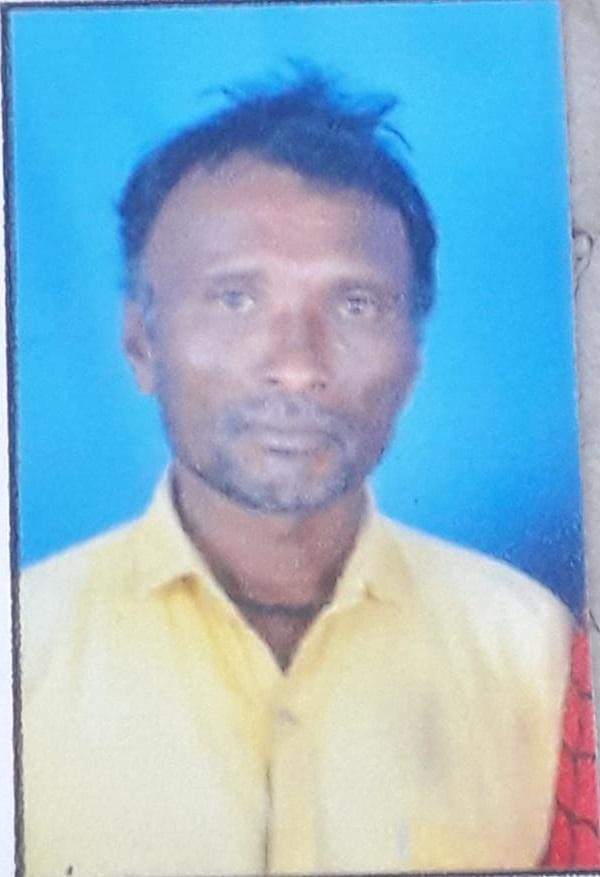India
Dalit Man Killed by Money Lender Over ₹3000 Loan Default in Latur
The accused demanded ₹20,000 with interest

Renapur, Latur — Giridhari Tapaghale, a Dalit man, was tragically killed by a money lender and his nephew after failing to repay a loan of Rs.3000. The accused, identified as Laksham Markand and Prashant Waghmode, have been apprehended and are currently in police custody for a period of five days, according to Police Inspector Deepak Shinde, who spoke to Indie Journal. Two separate First Information Reports (FIRs) have been filed, encompassing multiple charges, including violations of the Scheduled Castes and Scheduled Tribes (Prevention of Atrocities) Act, 1989.
The incident unfolded on the morning of June 2 when the assailants visited Tapaghale's residence to demand a sum of ₹3,000. When the 48-year-old Giridhari refused to comply, a heated argument ensued, leading the accused to attack him with a steel rod. Giridhari suffered severe blows to his right hand, legs, and head, while enduring casteist slurs. Prior to the assault, the attackers allegedly threw chili powder into the victim's eyes. Tapaghale, a member of the Matang Scheduled Caste, succumbed to his injuries while receiving medical treatment at the hospital. His wife and mother also sustained injuries during the attack.
Vipul Tapaghale, the deceased's nephew, provided an account of the events leading up to the tragedy. "The accused is a money lender. My uncle had borrowed ₹3,000 from him for a month. After my uncle returned from a month of labor work, he attempted to repay the money, but Lakshman insisted on receiving ₹20,000 instead. As my uncle expressed his inability to meet that demand, a verbal altercation erupted," he explained.
Prior to this incident, both parties had engaged in a fight on May 23. Following the altercation, the victim approached the local police; however, the authorities purportedly refused to register a complaint. Inspector Shinde refuted these allegations, stating that Lakshman, belonging to the Hatkar Dhangar caste, was not a money lender, but rather a friend from whom Giridhari had borrowed money. Vikas Patharikar of Lahuji Kranti Dal, on the other hand, contradicted this claim, stating, "The victim borrowed ₹3,000 from the accused and paid more interest than the principal. The accused demanded ₹20,000 with interest, but Giridhari refused."
Elaborating on the incident, Vipul stated, "Subsequently, my uncle managed to gather around ₹5,000 and went to give it to Lakshman. However, instead of accepting the money, Lakshman assaulted my uncle with a stick. This resulted in a fractured hand for my uncle. When we went to file a complaint against him, we discovered that he had already filed a counter-complaint against our family."

Vipul further accused the police of siding with the accused and covering up the incident. "Afterward, my cousin was arrested by the police. They used force on him and coerced him into writing a formal apology, vowing not to engage in such behavior again. The police unjustly favored the criminal without hearing our side of the story. It's inhumane," he asserted.
Later, Vipul made serious allegations against the local police regarding the events of June 2. "The accused's nephew arrived from Pune on June 5 and, early in the morning, went to my uncle's house, where he started assaulting my grandmother and aunt with a steel rod. When my aunt and grandmother managed to flee, the attackers turned their attention to my uncle. Given that my uncle's hand was already in a cast, he was unable to defend himself. When my family reached the police station, the authorities refused to listen to us, insisting that my uncle must be present before they could register a complaint. Despite our explanation of his condition, they remained unconvinced. They dispatched a constable to the hospital where my uncle was admitted, and the constable claimed that my uncle's injuries were not severe. Only when I showed them the video footage of my uncle did they finally file the FIR. Unfortunately, my uncle passed away at 3 a.m. later that night. It was only then that they began to act swiftly, realizing the gravity of the situation."
आद.प्रकाश तथा बाळासाहेब आंबेडकर साहेब मरीन लाईन पोलिस स्टेशन येथे पीडित कुंटुबाला भेट
— Lakhan Jondhale (@LakhanJond50391) June 8, 2023
मुंबई मध्ये सावित्री बाई फुले वस्ती गृहात अकोला येथील युवतीचा नराधमा ने बलात्कार करून खूण केला..! pic.twitter.com/HbjxCag68x
Inspector Shinde downplayed these allegations, stating, "The victims are currently in a vulnerable state, and they may be exaggerating the situation. Furthermore, they failed to register a complaint themselves on May 23."
Patharikar highlighted that caste violence is prevalent in the area and recounted a previous incident involving the killing of Balaji Kamble, who was murdered by a landowner, a member of the Maratha caste, because Balaji's sheep had entered the landowner's farm. He also mentioned an incident where a Matang caste Sarpanch (village head) was paraded partially naked in front of the entire village over a minor dispute.
When questioned about the reasons behind such incidents, Patharikar blamed local leadership for attempting to resolve matters locally instead of involving the police to defuse tensions. "By avoiding police intervention, the gravity of the situation is undermined, thereby encouraging others to engage in similar acts, as they feel they can act with impunity," Patharikar emphasized.
A second FIR was lodged by Kamal, Giridhar's wife, against Lakshman's wife and sister, alleging harassment. The incident occurred on the morning of June 5, as Kamal and her nephew Rani were returning home from the market after completing the last rites of Giridhar. Sulochana, Lakshman's wife, and Shubhangi, his sister, intercepted Kamal and Rani. Sulochana threatened to kill Kamal and her entire family, citing her husband's imprisonment. She flaunted her husband's actions and subjected Kamal to casteist slurs. Moreover, she attempted to intimidate Rani by mentioning that her husband had previously thrown chili powder into Giridhar's eyes. Following the incident, both Sulochana and Shubhangi were arrested by the police.
#रेणापूर शहरातील तपघाले कुटुंबियांना व्याजाच्या पैशाच्या कारणावरून झालेल्या मारहाणीमुळे श्री. गिरीधारी तपघाले यांचा मृत्यू झाला. मनाला चटका लावणारी ही घटना आहे. तपघाले कुटुंबियांची आज रेणापूर येथे जावून भेट घेतली. कुटुंबातील जखमी व्यक्तींची विचारपूस करून त्यांना धीर दिला.
— Dhiraj V Deshmukh (@MeDeshmukh) June 9, 2023
मारहाण… pic.twitter.com/ggQxLYO0rA
The incident has sparked significant backlash on social media. Senior economist Sanjeev Chandorkar criticized India's banking and private lending systems on his Facebook post, highlighting their propensity for caste discrimination and lack of regulation. Chandorkar pointed out that caste still plays a dominant role in India's economic activities, referencing how Manusmriti advocates for caste-based interest rates. He also questioned the role of the Reserve Bank of India (RBI) as a regulator, asking, "Does the RBI consider these incidents as exceptions or indicative of a looming crisis while curbing the influence of public sector banks in the micro sector?"
Chandorkar expressed concerns about the lack of regulation in the private lending sector, including interest rates, recovery methods, and the role of state governments. "As we celebrate the 50 percent growth of the microcredit industry, the Microcredit Regulatory Bill is still pending in Parliament, as it is convenient for those associated with it. Providing identity alcohol to the poor burdened by microcredit is even more convenient," he remarked.
Dalit attacks in Maharashtra have been on the rise. At the beginning of this month, a 22-year-old Buddhist youth, Akshay Bhalerao, was brutally lynched, allegedly by a group of Maratha youth in Nanded's Bondhar Haveli village. Activists following the case claim that Akshay was targeted and stabbed to death out of resentment for organizing the village's first-ever Ambedkar Jayanti celebration around a month ago. The Nanded Rural Police have booked six suspects under 16 charges, including violations of the Scheduled Castes and Scheduled Tribes (Prevention of Atrocities) Act, 1989.





